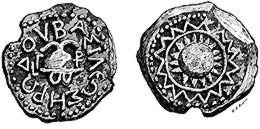|
Herodion
Herodion is a popular mispronunciation of ''Herodeion'', the Greek name of Herodium, a hill, palace-fortress, and town named after King Herod the Great. Heodion is also an ancient Greek given name that may refer to * Herodion of Antioch (died AD 136), Christian martyr and Bishop of Antioch *Herodion of Patras Herodion of Patras (also Herodian or Rodion; el, Ἡρωδίων, Ἡρωδιανός, Ῥοδίων) was a relative of Saint Paul whom Paul greets in Romans 16:11. According to tradition, he was numbered among the Seventy Disciples and became bis ..., a Christian saint and relative of Saint Paul {{given name Masculine given names ... [...More Info...] [...Related Items...] OR: [Wikipedia] [Google] [Baidu] |
Herodium
Herodion ( grc, Ἡρώδειον, ar, هيروديون, he, הרודיון), Herodium (Latin), or Jabal al-Fureidis ( ar, جبل فريديس, , "Mountain of the Little Paradise") is an ancient Jewish fortress and town, located in what is now the West Bank, south of Jerusalem and southeast of Bethlehem. It is located between the Palestinian villages of Za'atara and Jannatah, and adjacent to the Israeli settlement of Sdeh Bar and to a military base from the south. Prior to the publication of ''Biblical Researches in Palestine'' in 1841, the site was known variously as Frank Mountain, the Mountain of Little Paradise, or Bethulia; Edward Robinson's identification of the site as Herodium was based on the description found in Josephus. Josephus described a palace fortress and a small town, named after Herod the Great, built between 23 and 15 BCE. A sarcophagus discovered in 2007 was claimed to belong to Herod as it was more ornate than others found in the area. Herodium is 75 ... [...More Info...] [...Related Items...] OR: [Wikipedia] [Google] [Baidu] |
Herodion Of Patras
Herodion of Patras (also Herodian or Rodion; el, Ἡρωδίων, Ἡρωδιανός, Ῥοδίων) was a relative of Saint Paul whom Paul greets in Romans 16:11. According to tradition, he was numbered among the Seventy Disciples and became bishop of Patras, where he suffered greatly. After beating, stoning, and stabbing him, they left him for dead, but St. Herodion arose and continued to serve the Apostles. He was beheaded with Olympas in Rome while they were serving Saint Peter on the same day that St. Peter was crucified. His feast days are celebrated on January 4 among the Seventy, April 8, and November 10. Hymns November 10 Troparion ( Tone 3 :Holy Apostles, Erastus of Paneas, Erastus, Olympas, Herodian, Sosipater, Quartus and Tertius, :entreat the merciful God, :to grant our souls forgiveness of transgressions. Kontakion (Tone 2) :Illumined by divine light, O holy apostles, :you wisely destroyed the works of idolatry. :When you caught all the pagans you brought th ... [...More Info...] [...Related Items...] OR: [Wikipedia] [Google] [Baidu] |
Herodion Of Antioch
Saint Herodian or Heron (died 136 AD) was a 2nd-century Christian martyr In Christianity, a martyr is a person considered to have died because of their testimony for Jesus or faith in Jesus. In years of the early church, stories depict this often occurring through death by sawing, stoning, crucifixion, burning at t ... and Bishop of Antioch, successor of Ignatius at Antioch, a title he held for two decades. References 136 deaths Saints from Roman Syria 2nd-century Christian martyrs Year of birth unknown {{Saint-stub ... [...More Info...] [...Related Items...] OR: [Wikipedia] [Google] [Baidu] |
Herod The Great
Herod I (; ; grc-gre, ; c. 72 – 4 or 1 BCE), also known as Herod the Great, was a Roman Jewish client king of Judea, referred to as the Herodian kingdom. He is known for his colossal building projects throughout Judea, including his renovation of the Second Temple in Jerusalem and the expansion of the Temple Mount towards its north, the enclosure around the Cave of the Patriarchs in Hebron, the construction of the port at Caesarea Maritima, the fortress at Masada, and Herodium. Vital details of his life are recorded in the works of the 1st century CE Roman–Jewish historian Josephus. Herod also appears in the Christian Gospel of Matthew as the ruler of Judea who orders the Massacre of the Innocents at the time of the birth of Jesus, although most Herod biographers do not believe that this event occurred. Despite his successes, including singlehandedly forging a new aristocracy from practically nothing, he has still been criticised by various historians. His reig ... [...More Info...] [...Related Items...] OR: [Wikipedia] [Google] [Baidu] |

.jpg)
